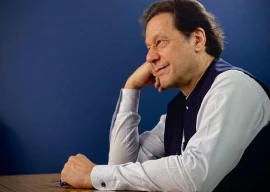Urvashi Butalia was speaking at Sustainable Development Policy Institute’s (SDPI) 13th conference, titled “Peace and Sustainable Development in South Asia: The Way Forward”, which started in Islamabad on Tuesday.
Butalia, who was born in Ambala, and is founder of the publishing house Kali for Women (catering solely to female writers) was the last person to speak during the plenary session, at which the federal secretary of the ministry of environment gave a very boring speech filled with clichés and bad pronunciation.
She started off by talking about what she said was a recent meeting she had in New Delhi with an organisation calling itself the “Pakistan Oustees Group”.
Before she began her story, she said that she was not an expert on any of the issues that were going to be discussed at the conference such as climate change, post-floods relief and rehabilitation and that her interest lay primarily in stories from the ground above, about real people. (Incidentally, this was the subject of her ground-breaking book “The Other Side of Silence: Voices from the Partition of India”.)
She said the group comprised of people who, over the years, had come from Pakistan, after crossing the border. They were mostly living in Barmer, in the Indian state of Rajasthan, and included some Muslims as well.
Batalia said that most of these people were from parts of interior Sindh and Balochistan and had not moved to India during the time of partition, mainly because the violence was far from where they lived and there was no immediate pressing need for them to move to India.
However, this changed with the nature of Pakistan’s relationship with India and she said there were two subsequent periods, where more than 100,000 people migrated. These migrations coincided with the two wars the neighbours had, in 1965 and then in 1971.
Butalia added that the issue now was that most of those who had come to India had had Pakistani passports, which have since expired. So they could not get new passports, not that they want new Pakistani passports now.
As for the Indian government, it did not consider them refugees because they left Pakistan voluntarily and not to flee a war or persecution as such. However, over the years, things had become difficult for religious minorities in Pakistan and this movement post-1947 was part of that.
She also explained that this group included Muslims because some of them, living close to the border on the Pakistani side, had married spouses in India and since the stringent visa regime made it very difficult for such marriages to carry on. So some spouses on the Pakistan’s side simply crossed the border.
Towards the end of her lecture, Butalia told the story of Rajender Bedi and Chaudhry Abdul Latif. Bedi, a teacher in Lahore, had to flee because of the violence at the time of partition and left his vast library and trove of books behind in Lahore. His house was allotted to Latif, who had migrated from East Punjab.
Over the years, Bedi tried to get his books back. Once, he even managed to return to Lahore. He went back to his former house but Latif was not there, so Bedi had to return to India empty-handed. He then wrote a letter to Latif, which eventually became the foundation of a blossoming relationship which lasted till both men died. Butalia hoped that this sense of friendship will continue to blossom between the two countries.
Published in The Express Tribune, December 23rd, 2010.



1732259077-0/carti-(1)1732259077-0-165x106.webp)



1732258132-0/BeFunk_§_]__-(26)1732258132-0.jpg)
1732257537-0/Copy-of-Untitled-(64)1732257537-0-270x192.webp)
1726722687-0/Express-Tribune-Web-(9)1726722687-0-270x192.webp)







COMMENTS
Comments are moderated and generally will be posted if they are on-topic and not abusive.
For more information, please see our Comments FAQ